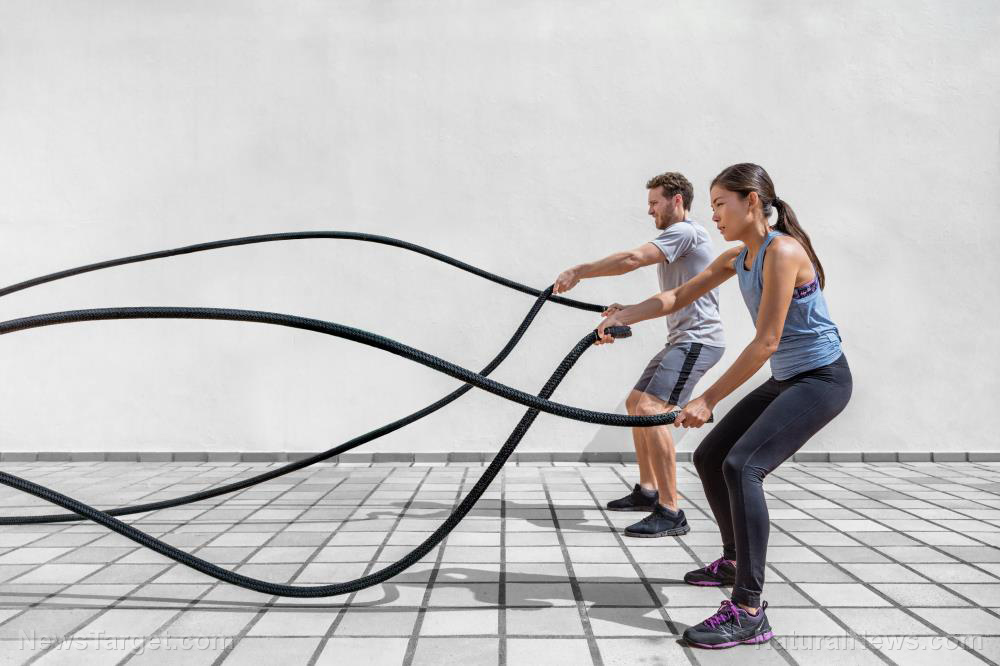Your exercise routine may be doing a number on your digestion: Here’s how to fix it
09/26/2019 / By Zoey Sky

Exercising is a great way to maintain your health. However, certain kinds of exercise can affect your digestive health and cause conditions like constipation.
How can exercise cause constipation?
Digestive problems are often caused by your diet or an underlying condition. But did you know that exercise can also cause constipation?
Sometimes, exercise can shock your body and its internal processes. This results in digestive issues.
Working out too hard can make you sweat a lot. This can result in dehydration, a factor that can cause constipation.
Your gut can also be influenced by the intensity of your workouts. Since there are various types and levels of exercise, it’s highly possible that working out can cause constipation and that consistently doing high-intensity interval training (HIIT) can cause digestive issues.
What is HIIT?
High-intensity interval training is popular among health buffs because it doesn’t require too much space and time, meaning HIIT can be done even at home and in quick bursts.
HIIT also offers many health benefits:
- It lets you customize your exercise routine.
- It can boost your metabolism.
- It promotes weight loss.
- It improves your heart health.
- It preserves muscle mass during weight loss.
However, HIIT can be very intense for beginners.
Dr. Robin Berzin, a Functional Nutrition Program instructor at Mind Body Green, explains that doing HIIT workouts frequently often affects the digestive health of people who love to exercise.
Berzin notes that how you move can also affect your digestion. For example, doing HIIT workouts every day can severely stress your body.
Your gut must be relaxed before it can move. But if you’re in a constant state of stress throughout the day followed by a HIIT session, your gut won’t have enough time to relax, digest, and move.
HIIT is very tough on the body. While this can improve your strength and stamina, it can also significantly affect your digestive health.
If you’re a HIIT beginner and occasional sessions don’t cause any digestive issues, you can maintain your routine.
However, if you notice that HIIT is causing constipation, making small changes can help improve your situation.
Addressing HIIT-related constipation
Once you confirm that your HIIT routine is causing digestive problems, address it by switching to a low-intensity workout. Restorative lower impact and lower-intensity workouts will help give your digestive tract enough time to relax and move properly. (Related: Natural remedies for tummy troubles.)
If you don’t want to stop HIIT workouts altogether, don’t do them too close to your mealtimes. Taking a break from HIIT will give your digestive system enough time to do its job and prevent constipation.
Berzin recommends incorporating more restorative exercises, such as Pilates, walking, or yoga.
Yoga helps get your bowels moving and relieves constipation. Some poses can massage the digestive tract and help to move stool through the intestines.
Poses that involve sustained twisting of the torso or crunching of the stomach muscles are particularly beneficial if you have digestive problems. Here’s a yoga pose that you can try if you have HIIT-related constipation.
Supine twist
This twisting pose helps massage the digestive tract and stimulates blood flow to the stomach muscles.
- Lie flat on your back, then bring both your knees up to your chest.
- Stretch out your left leg.
- While your shoulders are pressed against the floor, move your right knee across your body to the left, then look to your right. Hold this position for 20 breaths, then exhale.
- Repeat the same process on the other side of your body.
Anything in excess is bad, including exercise. While the benefits of HIIT exercises outweigh the cons, it is best to incorporate lower-intensity workouts in your routine to prevent constipation and maintain your digestive health.
Sources include:
Tagged Under: constipation, digestion, digestive problems, exercise, fitness, gut health, high-intensity interval training, HIIT, low-impact workouts, low-intensity workouts, Pilates, remedies, slender, walking, Yoga
RECENT NEWS & ARTICLES
COPYRIGHT © 2017 MENS FITNESS FOCUS


















